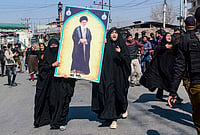Tensions have flared between the Philippines and China following a collision between a Philippine boat and a Chinese ship near a disputed reef in the South China Sea on Sunday.
The Philippines alleges that China engaged in harassment, blocking, and dangerous manoeuvres during the incident. China's coastguard, in response, claims that two Philippine vessels illegally entered waters near Ren’ai Reef without Chinese government approval.
Gan Yu, spokesperson for China's coastguard, called on the Philippines to halt what it deems provocative acts, asserting that Beijing will continue law enforcement activities in its waters.
Meanwhile, the Philippine coast guard accuses China of firing water cannons and ramming resupply vessels, resulting in serious engine damage to one vessel. Jay Tarriela, a spokesperson for the Philippine coastguard, refutes China Coast Guard disinformation, stating that the M/L Kalayaan suffered severe engine damage and the UM1 was rammed by a Chinese Coast Guard vessel.
The Philippines and China have a long history of maritime incidents in the contested South China Sea, a critical waterway for annual ship-borne trade surpassing $3 trillion.
What is the South China Sea dispute?
The South China Sea is globally recognised as one of the busiest and most crucial waterways for trade and merchant shipping. The disputes in the area involve competing claims by different countries, including China, Vietnam, the Philippines, Taiwan, Malaysia, and Brunei. These disagreements have historical roots, but recent years have seen a notable escalation in tension.
China's expansive claims, asserting sovereignty over both land and adjacent waters, have been a source of contention. The Paracels and the Spratlys, among other zones, have been subject to competing claims by various nations. China has reinforced its claims through island-building activities and naval patrols.
Competing claimants, including Vietnam, the Philippines, Taiwan, Malaysia, and Brunei, have challenged China's assertions. The United States, while maintaining a position of non-partisanship in territorial disputes, has conducted "freedom of navigation" operations, involving military ships and planes near disputed islands. Japan, although not directly involved in the South China Sea dispute, supports claimants like Vietnam and the Philippines by providing ships and military equipment.






















